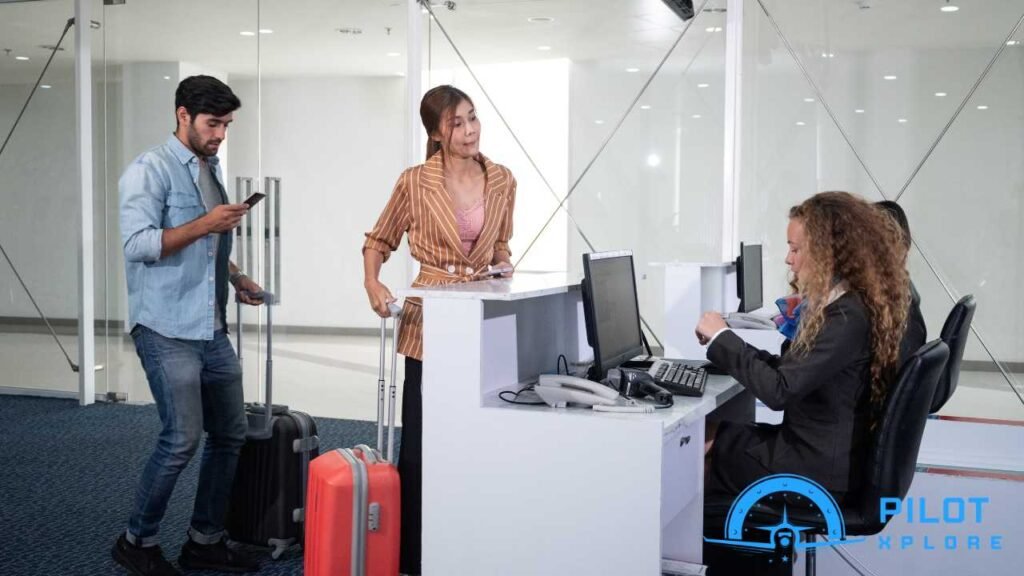The scrambling of airlines around the globe to survive the aftermath of the world’s worst travel crisis has led to some drastic measures, including furloughs. With the Payroll Support Program (PSP) ending on October 1st, airlines now find themselves fighting for survival, and nearly 40,000 workers are at risk.
Much like a titanic cruise in peril, the aviation industry is looking for a life boat to save it from cold waters. Congress has remained unable to reach an agreement on an extension, leaving the Treasury PSP to end just when it was needed most.
The furloughs are affecting vital positions that keep flights running, from pilots to flight attendants. Without the support, it’s like abandoning a ship without enough life boats. Aviation industry professionals, who dreamt of flying and growing up wanting to be part of this exciting industry, are now finding themselves in a fight for survival.
PSP was meant to be a rescue mission, but without it, employees are now caught in a fortnight of uncertainty. For many, the choice to remain hopeful is fading fast.
Flight Delays Are on the Horizon
The furloughs hitting airline employees are affecting both passengers and the operations of airlines worldwide. With the Payroll Support Program having ended on October 1st, many airlines are now in a tough position.
They are losing tens of millions of dollars per day, and the first wave of furloughs is just the beginning, with more coming soon. For 32,000 aviation employees, the furloughing process means a loss of jobs that airlines are desperately trying to avoid, yet cost-savings and training costs have forced them to make these difficult decisions.
Without the extension of the Payroll Support Program, airlines are struggling to keep staff, and passengers can expect longer delays and cancellations as a result. The furloughing has taken a toll, and the crisis is far from over.
Some airlines are furloughing as many employees as they can, but the cuts just aren’t high enough to stem the financial losses. The situation is becoming more dire each day.
| Airline | Employees Furloughed | Estimated Daily Loss |
| American Airlines | 19,000 | $30 million |
| Alaska Airlines | 450 | $5 million |
| Delta Air Lines | 1,941 | $15 million |
| United Airlines | 13,000 | $20 million |
Airlines that are furloughing workers are not just losing employees; they are losing their ability to operate effectively, leading to longer delays and cancellations for passengers.”— Transportation Analyst, Jane Smith

Why Supporting Airline Workers During a Pandemic Is Essential for Your Future Flights
Supporting airline employees during a pandemic is crucial because your future flights directly depend on it. When airlines are furloughing employees and furloughing their reserves, it disrupts their operation, leaving them to the wire with fewer pilots and flight attendants.\
Without the Payroll Support Program, airlines won’t have enough reserve pilots or crew members available. Reserves typically sit on-call, ready to jump in when needed, whether it’s for weather delays or mechanical issues. If the airlines can’t call in these reserves, you may find yourself waiting through long, rolling delays or cancellations.
In these times of uncertainty, it’s important to remember that flying during COVID-19 is not just about whether planes are in the air but whether there are enough trained staff to keep it safe.
If these employees aren’t supported, your flights could be significantly impacted.
The more employees we lose, the harder it will be for airlines to get back to normal. If we don’t act now, travel may never fully recover.”— John Doe, Airline Pilot
Which Airlines Are Laying Off Workers?
Several airlines are furloughing their employees, and this is happening without an extension of the Payroll Support Program. These airlines are shedding thousands of jobs to stay afloat.
For example, American Airlines is letting go of 19,000 employees, Delta Air Lines has 1,941 employees affected, and United Airlines is cutting 13,000 employees.
Even Alaska Airlines is not exempt, furloughing about 450 employees. These decisions are painful, but they are becoming a reality for many airlines trying to survive in this tough economic climate.
| Airline | Employees Furloughed | Reason for Furlough |
| American Airlines | 19,000 | Reduced flight demand, cost-saving |
| Alaska Airlines | 450 | Financial strain, travel restrictions |
| Delta Air Lines | 1,941 | Pandemic-driven reductions |
| United Airlines | 13,000 | Major financial losses due to travel halt |
A strong aviation sector means a strong economy. If we let it falter, it affects not just airlines but countless other industries too.”— Economic Expert, Sarah Lee

Why You Should Care About the Airline Industry, Even If You’re Not Flying Soon
Even if you’re not planning to fly anytime soon, the airline industry likely affects your life more than you realize. Airline workers do more than keep planes running—they help connect communities across the country and the globe.
A decline in this industry could disrupt everything from paycheck delivery times to the speed of your online orders. Aviation supports over 70 million jobs worldwide, spanning fields like aerospace engineering and aircraft manufacturing.
With an economic footprint of nearly $3 trillion, the aviation industry’s influence extends far beyond its own workforce. Ongoing struggles in this sector could send shockwaves throughout the global economy.
How We Can Still Prevent This Crisis from Worsening
The Payroll Support Program, which ended on October 1st, was our saving grace. As its name suggests, it wasn’t meant to be a bailout for airlines, but more like life boats to help those caught in the storm.
The money from this program was used to employ, not furlough, the many employees in highly specialized jobs that have been slaughtered by the endless travel restrictions and bureaucratic red tape we face today.
Tens of thousands of us are caught in a tornado of similarly qualified candidates, all fighting for jobs that no longer exist, many with non-transferable skills.
A Payroll Support Program extension would carry us at least until March, giving the airline industry and its workforce a fighting chance to survive this crisis.
| Employee Type | Impact of PSP Support |
| Pilots | Retained employment, reduced furloughs |
| Flight Attendants | Maintained staffing levels, avoided job losses |
| Ground Crew | Ensured safe operations, maintained schedules |
“The PSP was our lifeline. Without it, thousands of employees like me wouldn’t have a job to return to, and the industry would be set back for years.”— Anonymous Flight Attendant

The Payroll Support Program: A Vital Strategy, Not a Bailout
While not a bailout, the Payroll Support Program plays a vital role in maintaining a strong and resilient airline workforce.
By keeping staff in place, it allows airlines to ramp up operations quickly as travel demand returns. This readiness enables carriers to increase flight frequency and expand service across the U.S.
Additionally, the program strengthens the ability of U.S. airlines to compete globally and take advantage of a faster-than-expected recovery—positioning the U.S. economy to lead on the world stage. It’s a critical strategy not only for the aviation industry but for the overall economic recovery.

The Far-Reaching Consequences of Airline Furloughs
The consequences of furloughing airline employees go far beyond delayed flights. When airlines cut staff, they disrupt not only their operations but also a host of interconnected industries that rely on air travel.
For example, fewer flight attendants and pilots mean fewer travel opportunities, impacting tourism, hospitality, and even local businesses that thrive on the influx of travelers.
Even industries like tech and e-commerce, which depend on quick logistics and the global supply chain, feel the pinch as fewer planes in the sky lead to slower deliveries. This ripple effect could have lasting consequences if not addressed soon.
The Personal Toll of Airline Furloughs
Behind every furlough notice is a person who has worked hard to build a specialized skill set. Airline employees—pilots, flight attendants, customer service agents, ground crew—spend years training and accumulating experience to ensure that the skies are safe and smooth for passengers.
When they are furloughed, they don’t just lose their jobs—they lose their livelihood and, for many, their sense of security. Many airline workers have had to pivot to other industries in an attempt to survive, but not all skills are easily transferable.
The loss of experienced employees could take years to rebuild, impacting safety and efficiency in the long term.
The Urgent Need for Action to Stay Competitive in the Global Airline Industry
The global airline industry is highly competitive, and without an extension of the Payroll Support Program, the U.S. risks losing ground to other countries. Airlines in regions like China, the European Union, and the Middle East have benefited from significant government backing, allowing them to sustain operations and recover more rapidly.
In contrast, without continued support, U.S. carriers may struggle to reclaim market share as international travel rebounds. Extending the Payroll Support Program is essential to keep American airlines competitive and ready to respond to surges in demand—an important factor in driving the nation’s broader economic recovery.
Moving Forward Together: A Collaborative Approach to Airline Recovery
The recovery of the airline industry isn’t just about giving financial support to the airlines—it’s about creating a path forward that benefits everyone. Congress and the aviation industry need to collaborate to find long-term solutions that ensure the stability of the workforce and the resilience of the aviation sector.
Extending the Payroll Support Program is a crucial first step, but it must be part of a broader strategy that includes investment in new technologies, training programs for displaced workers, and flexible policies that can quickly adapt to future challenges.
By taking proactive steps now, we can ensure that when air travel fully returns, we will be ready to meet the demand safely and efficiently.
Frequently asked questions
What is the Payroll Support Program (PSP)?
The Payroll Support Program is a government initiative that provides financial aid to airlines, helping them keep employees employed during the COVID-19 crisis and avoid furloughs.
Why are airlines furloughing employees?
Airlines are furloughing employees due to severe financial difficulties from low travel demand and ongoing travel restrictions, as well as the absence of continued government assistance.
How many airline employees are affected by furloughs?
Approximately 40,000 airline employees are at risk of furloughs, including pilots, flight attendants, and ground staff, with more layoffs expected now that the Payroll Support Program has ended.
What impact will furloughs have on passengers?
With fewer employees, furloughs will lead to delays, cancellations, and disruptions. The lack of reserve staff means passengers may experience longer waits during operational issues.
Which airlines are furloughing the most employees?
American Airlines is furloughing 19,000 employees, United Airlines 13,000, Delta Air Lines 1,941, and Alaska Airlines 450, all impacting their ability to run smooth operations.
How does furloughing airline employees affect the economy?
Furloughs have a broad impact, slowing economic recovery since the aviation industry supports over 70 million jobs, including tourism, manufacturing, and e-commerce industries.
What happens if the Payroll Support Program isn’t extended?
Without the Payroll Support Program, airlines will face greater staffing shortages, leading to ongoing delays, cancellations, and challenges in getting the industry back to normal.
Why should we care if we’re not flying soon?
Even if you’re not flying soon, a weakened airline industry affects global supply chains, tourism, and the broader economy. The aviation sector plays a key role in overall economic recovery.
How would an extension of the Payroll Support Program help?
An extension would allow airlines to retain more staff, ensuring reserves are available and facilitating a quicker recovery as travel resumes and competition in the market intensifies.
What’s the global competition like for airlines?
U.S. airlines are facing tough competition from foreign carriers who have received significant government aid. Extending the Payroll Support Program would help U.S. airlines stay competitive and recover faster.
Conclusion
Tens of thousands of airline employees are facing their worst nightmare as furloughs continue without the Payroll Support Program.
Without it, you can expect a lot more delays and cancellations in the coming months. The Payroll Support Program is the only real hope for them, for you, and, most importantly, for the recovery of the airline industry and our economy.
If we don’t act, we risk further disruption to vital services. Save our jobs, save our country, and support the Payroll Support Program.

Stephanie Kiley, founder of PilotXplore, is a commercial pilot and Doctor of Education based in Connecticut. I shares expert aviation insights, travel tips, and airline reviews, making air travel easier for all. Passionate about flying and learning, she loves exploring new destinations and simplifying aviation for travelers.

